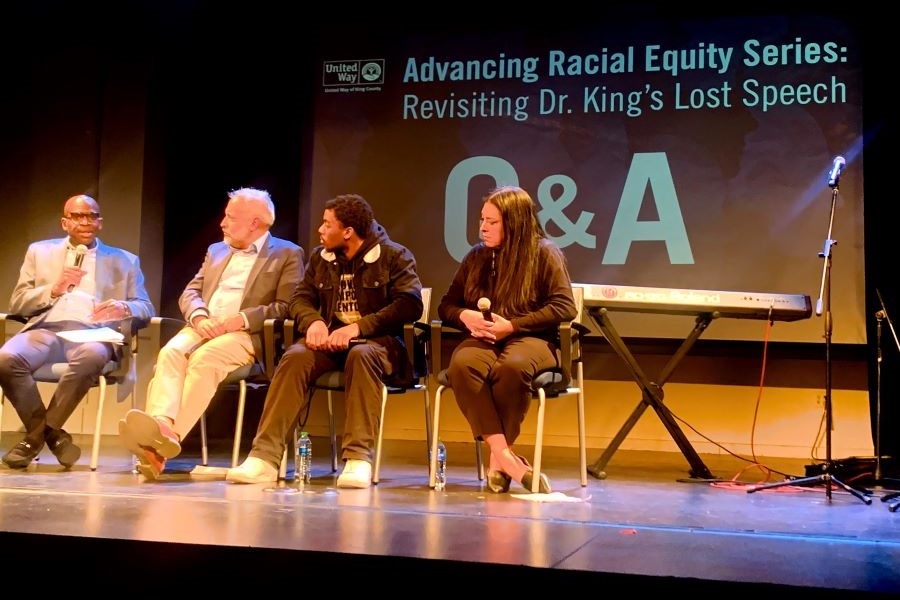Black History Month: Looking Back, Looking Ahead
On February 13, United Way of King County hosted a panel discussion about a 1964 speech Dr. Martin Luther King Jr. gave at the University of Dayton just months after the passage of the landmark Civil Rights Act. Three panelists—King County council member Jorge L. Barón, Eighth Generation CEO Colleen Echohawk, aspiring Green River Community College student Marcus Boston—and examined excerpts from the speech and considered how relevant Dr. King’s words are today. Those excerpts included the following:
“There is nothing more tragic than to build up a society with a large segment of people in that society who feel that they have no stake in that society. Economic deprivation, social isolation, poverty, and ignorance breed crime whatever the racial group may be, and it is a torture of logic to use the tragic results of segregation as an argument for the continuation of it. It is necessary to get rid of the causal source. And this is the great challenge facing our nation.”
Sound familiar?
One could argue that between 1964 and 2024, progress toward racial, economic, and justice has come so slowly that in many sectors of society, it’s barely noticeable. In fact, according to a 2022 report by KING 5 on homeownership cited Urban Institute data that showed the gap in the homeownership rate between Black and white families in the U.S. is larger today than when it was in the 1960s—when it was legal to refuse to sell someone a home because of the color of their skin.
Discriminatory housing practices like redlining and neighborhood covenants helped deny people the opportunity to build wealth through equity. Substandard schools and job discrimination have left many Black, Indigenous, and other people of color socially and economically isolated, even as neighborhoods around them flourish.

Here in King County, we can speak equity, justice, and opportunity with the best of them. Yet in the past three decades alone, as our county’s wealth has mushroomed, so, ironically, has its homelessness. Many people who are housed are either facing eviction or are one economic setback from it. Many have been forced to decide between putting food on the table, keeping their lights on, or paying rent. All too often, these crises disproportionately affect Black, Indigenous, and other people of color.
As Dr. King stated in his 1964 speech: “There must be massive goodwill in order get rid of that hardcore poverty which we still find all over our nation.”
I was a young man when Dr. King spoke of the racial, social, and economic ills of America—and when he foreshadowed a day when we would all be judged “not by the color of our skin but by the content of our character.” Looking back, I thought that the overall health of Black and Brown folks would be substantially improved.
To be honest, I didn’t envision that we would one day be led by a Black U.S. president, and I certainly didn’t think that the success of not only being elected but leading well would generate the backlash that has occurred. I didn’t see the fabric of our communities torn apart by the crack cocaine epidemic and mass incarceration.
Each year, we celebrate Black History Month by honoring individuals from the Black community who often overcame great odds to achieve great things. This year, I challenge us to honor the generations yet born, to remove the vestiges of systemic racism and economic deprivation from our society so that the odds of success will be greater for them.
That is why we at United Way support the Black Home Initiative, or BHI, a privately funded effort to create 1,500 new low-to-moderate income Black homeowners in South Seattle, South King County, and North Pierce County within five years. BHI aims to reduce inequity and increase intergenerational household wealth through a seven-point plan that includes credit and lending, purchase support tools, and sustaining existing owners.
In addition, United Way supports early learning programs like ParentChild+ and offers a Free Tax Preparation Campaign that helps put more of people’s hard-earned money back in their pockets. Though these programs are designed for all residents, they invariably benefit those who have suffered most from our society’s ills—Black, Indigenous, and other people of color.
These efforts keep me hopeful that, 60 years from now, generations to come will read Dr. King’s speech baffled that our society was ever that dysfunctional. Until then, I remain hopeful in the fact that we as a people have survived and overcome some of the most harmful and pernicious acts of society, and we are still contributing. History, fact-based analysis, and a worldview says we will get to the promised land.


Comments